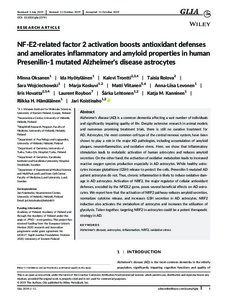NF-E2-related factor 2 activation boosts antioxidant defenses and ameliorates inflammatory and amyloid properties in human Presenilin-1 mutated Alzheimer's disease astrocytes
Iiris Hovatta; Matti Viitanen; Jari Koistinaho; Marja Koskuvi; Katja M. Kanninen; Šárka Lehtonen; Ida Hyötyläinen; Riikka H. Hämäläinen; Laurent Roybon; Kalevi Trontti; Anna-Liisa Levonen; Sara Wojciechowski; Minna Oksanen; Taisia Rolova
https://urn.fi/URN:NBN:fi-fe2021042821605
Tiivistelmä
Alzheimer's disease (AD) is a common dementia affecting a vast number of individuals and significantly impairing quality of life. Despite extensive research in animal models and numerous promising treatment trials, there is still no curative treatment for AD. Astrocytes, the most common cell type of the central nervous system, have been shown to play a role in the major AD pathologies, including accumulation of amyloid plaques, neuroinflammation, and oxidative stress. Here, we show that inflammatory stimulation leads to metabolic activation of human astrocytes and reduces amyloid secretion. On the other hand, the activation of oxidative metabolism leads to increased reactive oxygen species production especially in AD astrocytes. While healthy astrocytes increase glutathione (GSH) release to protect the cells, Presenilin‐1‐mutated AD patient astrocytes do not. Thus, chronic inflammation is likely to induce oxidative damage in AD astrocytes. Activation of NRF2, the major regulator of cellular antioxidant defenses, encoded by the NFE2L2 gene, poses several beneficial effects on AD astrocytes. We report here that the activation of NRF2 pathway reduces amyloid secretion, normalizes cytokine release, and increases GSH secretion in AD astrocytes. NRF2 induction also activates the metabolism of astrocytes and increases the utilization of glycolysis. Taken together, targeting NRF2 in astrocytes could be a potent therapeutic strategy in AD.
Kokoelmat
- Rinnakkaistallenteet [19207]
